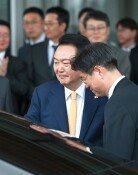Clinton-Trump, whoever wins will affect foreign policies
Clinton-Trump, whoever wins will affect foreign policies
Posted September. 28, 2016 07:29,
Updated September. 28, 2016 07:40
In the first presidential debate between Democratic candidate Hillary Clinton and Republican candidate Donald Trump held on Monday, six weeks before America’s presidential election, the KOR-US alliance and North Korea’s nuclear issue came to the table. Although the issues surrounding the Korean Peninsula appeared only briefly towards the end of the debate, we must carefully consider the implications.
Clinton criticized Trump for saying that South Korean and Japan should develop their own nuclear weapons. In response to this, Trump reiterated that the U.S. defends Japan, South Korea, and Saudi Arabia, but those countries do not pay back, acting as "security free-riders." Clinton accused of Mr. Trump for not understanding the severity of the nuclear issue, and Trump admitted that nuclear issue is the biggest threat to the world as a single matter, but argued that China should be dealing with North Korea. As former first lady, senator, and secretary of state, Hillary Clinton is undoubtedly more experienced in carrying out foreign policies, but Donald Trump would not be able to stick to his pledges even if he becomes the president.
Since North Korea’s latest nuclear test, the Korean Peninsula is likely to be put at the center of the next U.S. administration’s foreign policy, regardless of whoever the next president is. However, the two candidates are sharply divided in terms of countermeasures against the Kim Jong Un regime. In her statement condemning its recent nuclear test, Clinton said that if more countries possess nuclear weapons in North East Asia, chances of unimaginable things taking place would increase, and the U.S. cannot take that risk. This means she would not accept South Korea or Japan developing their nuclear weapons. Trump once said that he is willing to meet Kim Jong Un, which gives a prospect for resumed talks between the two nations. However, he had suggested pinpoint strike against the North’s nuclear reactors in his book published in 2000.
A majority of American media saw Clinton as the winner of the debate, CNN polls indicating that 62 percent of Americans felt Clinton won compared to 27 percent for Trump, but the actual turnouts are hard to predict. It is a close race. Kim Jong Un may have the intention to raise its bargaining power by showing off his military capabilities before the next U.S. leader comes up with a new policy. South Korea should also be prepared to cooperate closely with either Clinton or Trump to put more pressure against North Korea and strengthen the KOR-US alliance.
한기흥기자 eligius@donga.com







